Mary Ellen Lamb (Southern Illinios University) This film of Love’s Victory is a coup de theatre. Restoring the play to the place where it was originally performed, and to something like the way it was performed, this performance showcases the vitality of early modern household drama, for which we have so few examples. Amateur singing was more of an expected part of ordinary life than today, and song was a crucial aspect of this experience, moving and heightening specific moments. The music was sensational, and the actors were well up to the task, even in some instances singing a capella. The filming itself was highly professional, zooming in for intimate close-ups of the actors’ speeches as well as occasional shots to responses of onlookers. The actors were superb. I especially liked Cal Chapman as Philisses, who could convey so many emotions in these close-ups. The costuming was especially well-done, with bright colors that contributed visual vivacity to the scenes. The decision to cast Cupid as the malicious Arcas was a bold move that darkened Cupid’s character and by inference interestingly complicated the happy ending of the play.
Some specific moments that come to mind. One was near the beginning of the play, when Silvestra actually sits down at one of the tables and confides her otherwise-soliloquy to the audience members there. This audience engagement is in line with household drama, played by members of a family with their friends and retainers. Rustic’s comically crude delivery of his song in Act One with his rendition of the “paps … like apples round” deserved the laugh it got from the audience. The scene near the end of the play when Musella is poised to stab a willing Philisses avoids high hysteria without losing intensity. It is bone-chilling.
Plays are meant to be seen rather than only read, and seeing Love’s Victory enacted in performance is crucial to the experience of the play. Now authorized for public release, this film deserves to gain many appreciative viewers now and in years to come.
Comments on the Live performance
Don E. Wayne (University of California San Diego)
Message: I thought the performance of Love’s Victory was splendid. While the mythic and allegorical elements of the play require some prior knowledge on the audience’s part, there is a human dimension to both the play as written by Mary Wroth and as interpreted by Editor of the text, Producer and Dramaturg for the Penshurst performance, Alison Findlay, and by Director Emma Rucastle, and by the excellent actors and musicians, a human element that as performed was intellectually and emotionally powerful and exhilarating. I appreciated the subtle and semi-Brechtian approach to the production, which the director and actors discussed the next day with the conferees.
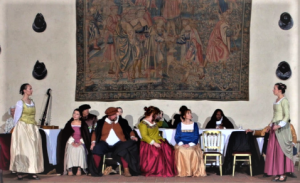
The production was admirable in how it engaged with the actual location of a storied Great Hall where in the 17th century Mary Wroth herself would have witnessed such entertainments, and how the actors engaged with the audience of 21st-century scholars and others who were fortunate to be present at this wonderful performance.
Alison Sorbie (Queens University, Montreal) ‘This was a marvellous production by an extremely talented troupe of actors, who seemed to enjoy performing together as an ensemble. I would single out particularly the characters of Musella and Simeana especially as excelling in the musicality their voices and expression, but also Silvesta, Phillises and Lissius for their convincing interpretations of character. It was really a pleasure to experience the performance in the Baron’s Hall at Penshurst, the most appropriate place. The period music was the ideal accompaniment and was woven into the drama with such sympathy that it perfectly complimented the evening as a whole.’ Alison Sorbie (Queens University, Montreal)
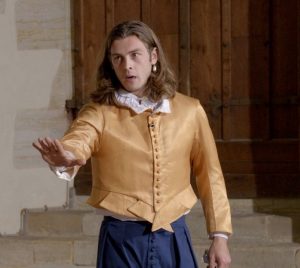

Karen Nelson (University of Maryland) ‘I thought the performance worked brilliantly. It was better than a dream come true to see it performed at Penshurst.
The concept, to set it as a coterie performance and have the actors at a table across a raised platform, worked very well… the ensemble was amazing, and every individual brought an enlightening perspective on the play.
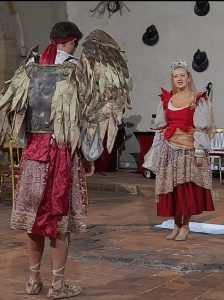 Venus (Francesca Swarbrick) and Cupid/Arcas (Miles Kinsley) did a compelling job of serving as catalysts for the action; their interludes operated very effectively, and the double-casting of Cupid and Arcas, along with Kunle Adenrian as Lacon/Priest and Isabella Williams as Fillis/Priest was an inspired interpretative move.
Venus (Francesca Swarbrick) and Cupid/Arcas (Miles Kinsley) did a compelling job of serving as catalysts for the action; their interludes operated very effectively, and the double-casting of Cupid and Arcas, along with Kunle Adenrian as Lacon/Priest and Isabella Williams as Fillis/Priest was an inspired interpretative move.
All of the lovers made their characters engaging and much more readily distinguishable than they are on the page. Imogen Greenwood as Simeana, Sammi Searle as Dalina, and Maggie Wignall as Musella, along with Isabella Williams as Fillis and Jessica Porter as Silvesta, provided excellent individuation of the characters in ways I couldn’t have imagined was possible. 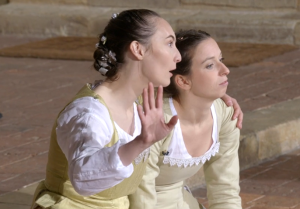
I appreciated, too, their comments in the discussion the next day about how this play, and these characters, performed women’s friendship and a mutuality and support that one doesn’t see in much drama of the period; they broadcast that camaraderie came throughout the production.
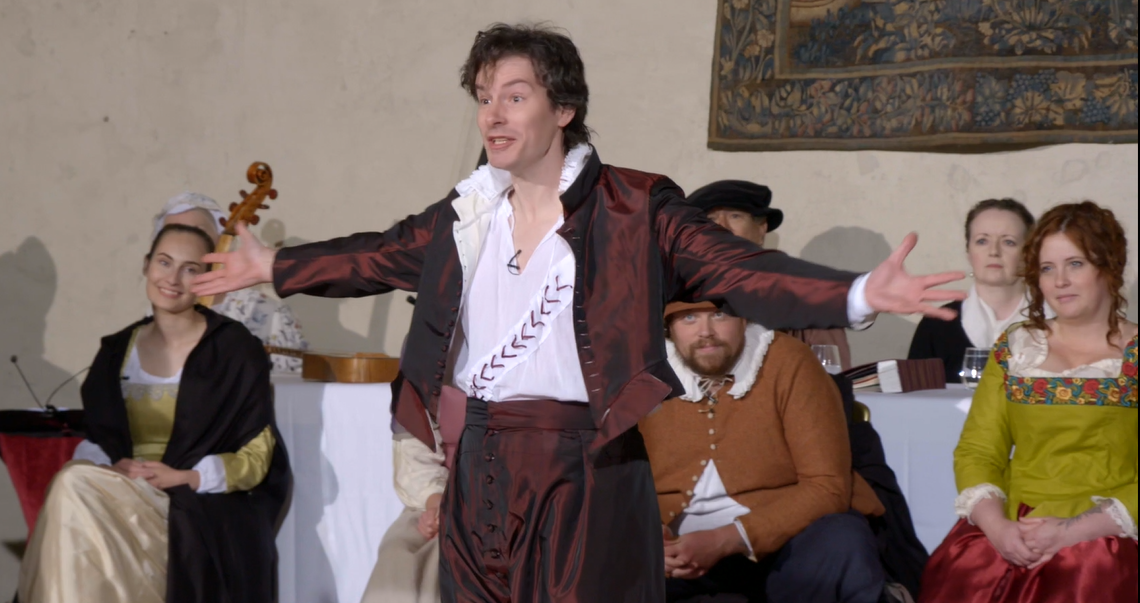 Cal Chapman as Philisses, Matthew Christmas as Lissius, and Adam Perrott as Rustic, too, made those characters more distinctive and more compelling than they are
Cal Chapman as Philisses, Matthew Christmas as Lissius, and Adam Perrott as Rustic, too, made those characters more distinctive and more compelling than they are  when one reads the play.
when one reads the play.
I was especially grateful for the ways that the production underlined the familial relationships, friendships, and enmities at work between members of the cast.
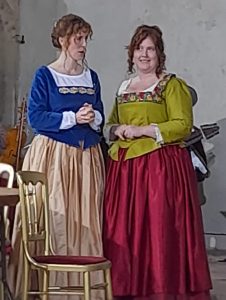
The singing and musical interpretation were top notch and contributed enormously to the performance overall. 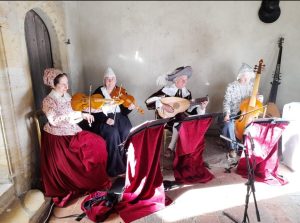 The musical team and the whole cast–really made this production a stand-out.
The musical team and the whole cast–really made this production a stand-out.
Emma Rucastle’s direction was brilliant- –even the games worked fairly well… Rucastle’s ability to envision this production is truly noteworthy. (Karen Nelson, University of Maryland)
Martina Kastnerová (University of West Bohemia): Imaginatively, ingeniously staged with a great synthesis of words and music, therefore impressive and moving for a spectator as an academician as well as a person. 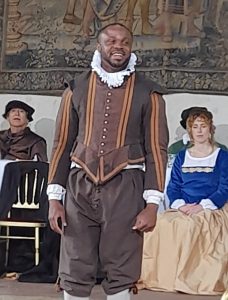
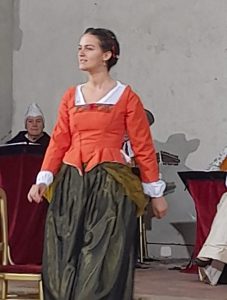
Excellently acted by all of protagonists, even in “minor” roles, everyone searching for their “love´s victory”.
Gerit Quealy (Journalist and Independent Scholar) Message: Beyond the amazing historical setting & getting a glimpse of what it might have been like to have been an audience for Wroth’s work at the time, it was a thrill to be able to experience the piece itself. I can’t imagine how long the rehearsal process took for all the comings & goings & getting the nuance in there to give it more texture. The voices were so perfectly in harmony & calibrated to the music, and the performances so alive & vivid that it gave a contemporary feel to the some of the antiquated elements of the material. Have we just always been fretting about love, love, love?
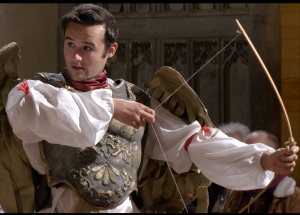
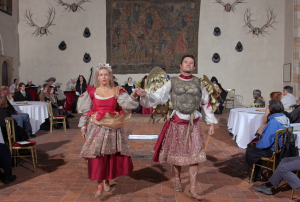
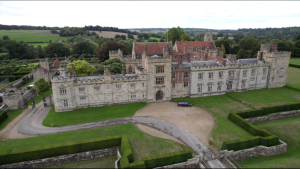
You must be logged in to post a comment.